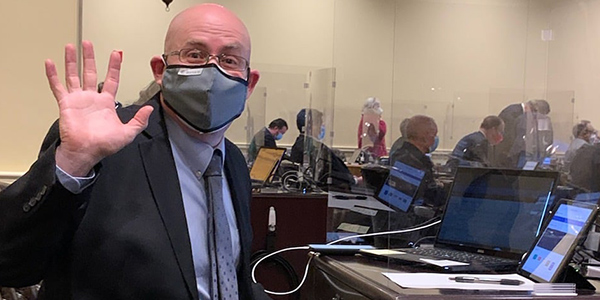A Maryland House committee on Monday rejected a proposed carbon pricing bill, with eight Democrats siding with seven Republicans in opposition. Only eight Democrats supported the bill in the 15-8 vote by the House Economic Matters Committee.
It was the fourth straight year that carbon pricing has failed to make it out of committee.
Sponsored by Del. David Fraser-Hidalgo (D), the Climate Crisis and Education Act (H.B. 33), would have imposed fees on fossil fuel sales and high-emitting vehicles to help reduce greenhouse gas emissions by up to 90% from 2006 levels by 2050.
Fees
The bill would impose a GHG pollution fee on all fossil fuels imported into the state for combustion.
The fee for non-transportation fuels would start at $15/ton of carbon dioxide equivalent on July 31, 2022, rising to $20 in 2023 and increasing by $5 each year through 2030 and remaining at $60 in 2031 and subsequent years.
The fee on transportation fuels would begin at $10/ton for July 31 through Dec. 31, 2022, increasing to $13 in 2023 and increasing by $3 each year through 2030 before leveling off at $37 in 2031. Public transit agencies would be exempt.
The fees would be collected at the first point of sale in the state and paid by the entity transporting the fossil fuel into the state, meaning wholesalers for fuel oil and gasoline and local distribution companies for natural gas.
“I am trying to change behavior — trying to do it in a pragmatic and realistic fashion,” Fraser-Hidalgo said in an interview with NetZero Insider.

Del. David Fraser-Hidalgo | Del. David Fraser-Hidalgo
At a Feb. 18 committee hearing on the bill, Fraser-Hidalgo faced skepticism over his contention that the bill could prohibit fees from being passed through as a direct cost to end users or customers of electric or gas utilities.
He cited a January 2020 letter from the state attorney general’s office that said it was “not aware of any general impediment to the General Assembly enacting such a prohibition.” But the letter added, “There may be circumstances under which the effects of such a pass-through prohibition could amount to an unlawful taking.”
“I know why this bill doesn’t go far [in the legislature]” said Del. C.T. Wilson, one of the Democrats who later opposed the bill. “The thought that they can’t pass fees down — I find that incredible that we’re supposed to believe that somehow, someway these businesses will not inject these fees and have the consumer pay for them.”
Wilson was also leery of promises that any impact on the poor would be addressed through rebate checks.
Republican Seth Howard was also dubious. “We heard big executives will pay for this. … Who is that? Is that somebody with a monocle and big bag of money running around? … A lot of these are publicly traded companies. … Hundreds of millions of people’s 401ks are diversified into some of these stocks.”
In written testimony, Brian Smith, state government relations and public policy manager for Washington Gas, said the no pass-through provision “could potentially raise Constitutional takings concerns.”
Smith said the utility calculated the $15/ton charge would increase residential gas bills by 7%, rising to 30% at $60/ton. Commercial rates would rise from 9% to 35%, he said. Columbia Gas of Maryland cited similar estimates.
“This would bankrupt companies I represent,” said Ellen Valentino, executive vice president for the Mid-Atlantic Petroleum Distributors Association.
Also opposing it were the Maryland Building Industry Association, the state Chamber of Commerce, Local 24 of the International Brotherhood of Electrical Workers, Maryland Farm Bureau, Maryland Transportation Builders and Materials Association and the Maryland Asphalt Association.
“This bill goes over and above what the Maryland Commission on Climate Change is recommending. The negative economic impacts to Maryland citizens will be substantial,” Colby Ferguson, director of government relations for the Farm Bureau, said. “To make matters worse, [some of] the fees that would be collect through the proposed fuel tax would not be used to cover the cost of transitioning to zero-emission vehicles, but instead to pay for a new Pre-K through 12 education program that has nothing to do with climate change.”
Supporters included the Audubon Naturalist Society, League of Women Voters, Sierra Club, the NAACP and the Maryland State Education Association.
Use of Proceeds
The fuel fees would generate $674 million in fiscal 2022, rising to $1.4 billion in fiscal 2026, according to a fiscal and policy note by the Department of Legislative Services.
The department said it was unable to provide a reliable estimate on the fees on high-emission vehicles.
Of the proceeds, the first $350 million annually would support public education through the Kirwan Commission fund.
The Household and Employer Benefit Fund would receive 50% of total revenues or all the revenues remaining after the distribution to the Kirwan fund, whichever is less, to mitigate the impact of fees on low- and moderate-income households and energy-intensive, trade-exposed employers.
Any revenues remaining after the distributions to the first two funds would go to the Climate Crisis Infrastructure Fund for investing in initiatives to expand the use of clean energy and energy efficiency or increase resiliency against climate change.
The bill would have provided the Benefit and Infrastructure funds a combined $324 million in fiscal 2023, rising to almost $1.1 billion in fiscal 2026.




